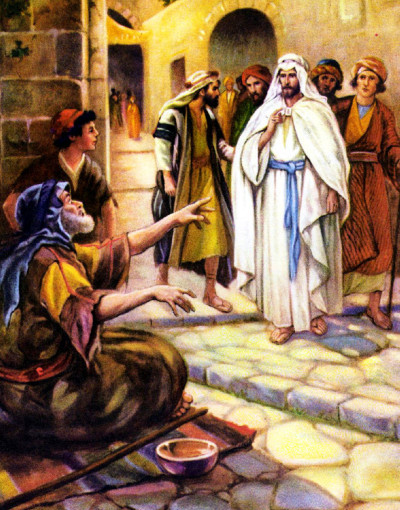You probably know me well enough that you know I’m going to say that the Gospel story that we have today isn’t about the healing of the blind man. And you’re right; I’m not. But you might be expecting me to say that the story is really about some more pervasive blindness that the man had, and truly, we all have, and the real miracle is that he was healed of that, and that we should reflect on what blindness we have and pray to be healed of that. And honestly, I thought that was how I was going to preach it, until Saturday afternoon when I noticed something I had never seen in the story before.
It’s a throw-away detail, almost, but it changed what the message was for me. It comes at the end of the Gospel, when Jesus tells the man, “Go your way; your faith has saved you.” And then it says that it the man received his sight and followed him on the way. So notice the difference: “Go your way” versus “followed him on the way.”
If Bartimaeus had gone his way, as Jesus suggested, he would have returned to sitting on his cloak begging for alms. After all, that was all he knew, having done it his whole life. But he had cast that aside in the pursuit of Jesus, and having received sight, he clearly saw that that was the wrong way, and instead follows Jesus on “the way.” So it’s important to note here that “The Way” was an early way that Christians, before they were called Christians, referred to themselves. They would be known as members of “The Way.” So here we see that the real miracle is that Bartimaeus clearly saw that his life lacked the meaning he needed and that the only cure was following Jesus.
That jibes well with the first reading today. Through the prophet Jeremiah, God says to the Israelites in persecution that he would bring them back: back to Israel, back to the Temple, back to himself. Then, even though they departed in tears – as indeed they did – they would return shouting for joy.
So the real miracle here is not one of blindness and seeing, but one of metanoia, which is the Greek word meaning a change in ones life – really a complete reversal – based on a spiritual interior conversion. The Israelites had been going the wrong way, so God gave them over to their persecutors, but because that penance produced conversion, he brought them back. Bartimeus had been going the wrong way living a pointless life of begging, but through giving himself over to Jesus and trusting in him, he found purpose in following him on The Way.
And we have to see what’s going on in our own lives. For me, even though I’ve been busy about the stuff of pastoral ministry, God has been doing amazing things calling me to new holiness. What is he doing in you right now? Have you been coasting in your spiritual life? Have you paid it little attention? If so, maybe God is calling you to forsake your own way, and give yourself over to The Way.



You must be logged in to post a comment.